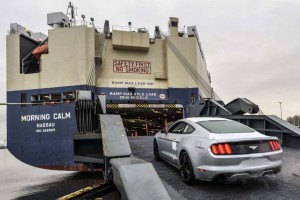
The 2015 Ford Mustang is the first to be sold globally. It'll be sold in 100 countries around the world.
America’s muscle car is going global. The first Ford Mustangs have been loaded on a ship bound for Asia, marking the first time in the pony car’s history that will be sold in more than 100 markets worldwide.
Sales of the 2015 Mustang will be launched in Europe later this year, according to the Detroit automaker, expanding the global One Ford program established by recently retired CEO Alan Mulally. The move should help firm up Ford’s position as one of the largest exporters of vehicles assembled in the U.S.
“Mustang is just one more example of the international demand for Ford cars and trucks,” said Joe Hinrichs, Ford’s President of the America, adding that, “The success of our One Ford plan presents opportunities for growth in global markets.”
To be clear, Mustangs have, in fact, been sold “around the world” since the pony car’s launch in April 1964 — but not with the big push Ford is planning now. In the 49 years prior to the latest-generation Mustang’s launch, a mere 161,000 of the pony cars were sold outside North America. That worked out to an average of barely 3,200 a year — in other words, a pittance compared to the American market, where total sales over nearly half a century amounted to around 9 million.
But demand was rising even before the 50th anniversary Mustang was introduced. Significantly, in 2012, more than 4,000 Mustangs were sold in 35 countries overseas, a substantial increase over the 49-year average. But that was little more than half the monthly average for U.S. Mustang sales.
Ford isn’t saying how much volume it expects once Mustang is fully established in markets around the world, but the maker has taken steps to ensure improved demand. Among other things, the 2015 model will be factory-built with both conventional Left-Hand Drive (LHD) and Right-Hand Drive (RHD). RHD is the motoring convention in Japan, the U.K. and most other former British colonies – with the notable exception of Canada.
(Hot, hotter, hottest? Ford turns up heat with Shelby 350GT. For more, Click Here.)
These Siamese-twin Mustangs will be assembled on the same line at Ford’s Flat Rock Assembly plant a few miles southwest of Detroit. This is a location where cast-iron engine blocks once were cast before a modern assembly plant was constructed on the same property. It operated as a joint venture with Mazda until 2012 when the Japanese maker ended U.S. production, leaving the facility all to Ford.
Curiously, this is not the first time RHD Ford cars have been built in the U.S. on the same line as conventional North American LHD cars. When the 1996 Ford Taurus switched to a new body, there was belief the car could be sold globally, so both RHD and LHD models were assembled at Ford’s Chicago Assembly Plant. (Both versions flopped in their marketplaces relative to the previous stellar U.S. performance of the original left-hand-drive Taurus.)
(Click Here for details about Ford’s plans to cut its global product platforms.)
Ford is taking other steps to localize the Mustang, and says it has done extensive testing on the Nurburgring, for example, to ensure the pony car is up to the high-speed driving demands of German drivers.
But perhaps the most important step in preparing for the global launch has been the addition of the new 2.7-liter EcoBoost engine. Designed to balance performance and fuel economy – critical in markets like Europe, where gas can cost $8 or more a gallon – the turbocharged EcoBoost is expected to be the engine of choice overseas.
(To see more about Ford’s new global performance unit, Click Here.)
Ford expects the new Mustang to help boost exports from its U.S. assembly plants, meanwhile. It shipped abroad about 380,000 vehicles made in the States in 2013, the latest year for which it has released numbers. That makes it one of the top exporters of American-made vehicles.
